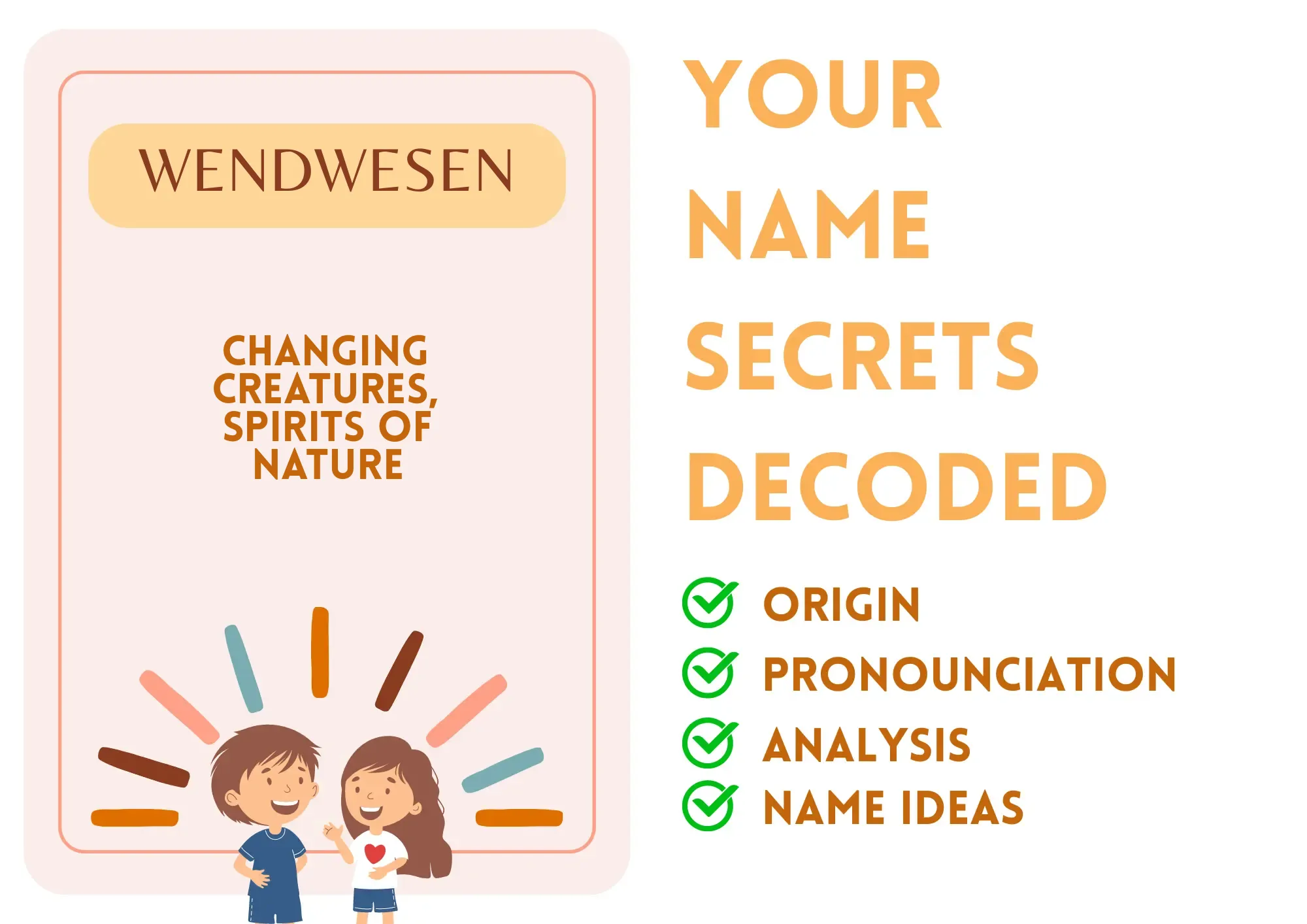
Wendwesen
Wendwesen is an intriguing name derived from German folklore, where it translates to 'changing creatures' or 'spirits of nature,' often associated with shapeshifting beings such as werewolves and other folklore entities. As a name, it is uncommon and can carry a sense of mystery and enchantment, often appealing to parents interested in mythology and nature themes.
This name is predominantly used for males but can also be applied to females, offering a unique unisex option. It is rooted deeply in Germanic traditions, reflecting cultural ties to the natural world and mythology. The name evokes feelings of connection with nature, the supernatural, and transformation.
Basic Information
Gender: Unisex
Sounds Like: VEN-dveh-zen
Pronunciation Explanation: The name is pronounced with emphasis on the first syllable 'VEN' and the second syllable pronounced like 'dveh', followed by a soft 'zen'.
Summary and Meaning
Meaning: changing creatures, spirits of nature
Origin: The name Wendwesen has Germanic origins, closely tied to folklore and mythology involving nature spirits and shapeshifters.
Usage: Wendwesen is more commonly addressed to males; however, its unique characteristics allow it to be considered unisex.
Name Number (Chaldean)
Name Number (Pythagorean)
Popularity (Global Rank)
Overall: 193979
Boys:
Girls: 77177
Most Popular in
Religious and Cultural Significance
Religion: Pagan
Background: In pre-Christian Germanic cultures, Wendwesen may have held spiritual significance, embodying the natural and supernatural worlds.
Cultural Significance: Connected to German folklore, Wendwesen represents a fascinating bridge between humanity and the spirits of nature, indicative of cultural appreciation for the environment.
Historical Significance: The concept of Wendwesen has historical ties to Germanic myths and legends, often illustrating the fluidity between man and beast, a theme that resonates within many cultural narratives.
Popular Culture
Literature and Mythology: Wendwesen figures prominently in various fairy tales and folk stories, representing nature’s transformative power and the duality of existence.
Movies and Television: While not mainstream, references to Wendwesen can be found in horror and fantasy films exploring the themes of shapeshifting and supernatural spirits.
Feelings and Perceptions
Perception: Wendwesen is perceived as a unique and evocative name, often instilling a sense of wonder and intrigue. It may attract admiration for its cultural roots but could seem complex to some.
Positive Feelings: Unique, mystical, transformative, nature-connected, adventurous.
Negative Feelings: Potentially exotic and difficult to pronounce for some, possibly too unusual for everyday use.
Practical Considerations
Ease of Writing and Calling: Wendwesen is relatively straightforward to write but may take some practice to pronounce correctly. It consists of nine letters and three syllables, which can make it a bit challenging in everyday usage but still memorable.
Common Typos and Misspellings: Windswesen,Wendwesen,Wenwesen,Wendewesen
Common Nicknames: Wendy,Wen,Wenwen
Wendwesen Popularity
Wendwesen Usage and Popularity By Country
| Country | Rank (Overall) |
|---|---|
| Ethiopia | 1205 |
| France | 98610 |
| United Kingdom | 118019 |
| United States | 186323 |
Wendwesen Usage and Popularity By City
| City | Rank (Overall) |
|---|---|
| Washington | 24818 |
| Seattle | 17340 |
Compatibility Analysis
Famous Persons Named Wendwesen
No results found for Wendwesen.
Related Names
Similar Sounding Names:
Wendell,Winston,Winslow